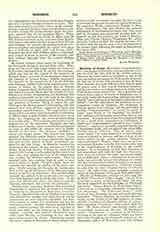

Honorius of Autun (HONORIUS AUGUSTODUNENSIS), a theologian, philosopher, and encyclopedic writer who lived in the first half of the twelfth century. Honorius has been correctly described as one of the most mysterious personages in all the medieval period. All that can be stated with certainty is that he flourished between the years 1106 and 1135, that he spent the greater part of that time in Southern Germany, and that he wrote a very large number of works, most of which have come down to us. He is generally said to have been a native of Autun in Burgundy, and in one of his works (De Luminaribus Ecclesiae) he styles himself “priest and head of the school (scholasticus) of Autun”. On the other hand, his references to contemporary events in Germany, the frequency of German glosses in his writings, and the possibility of reading “Augustodunensis” to mean “a native of Augst” (near Basle) or “of Augsburg” (in Swabia), have induced some historians to conclude that he was a German. In recent times it has been suggested that he was a monk of St. Augustine’s at Canterbury, in which case “Augstodunensis” should be read “Augustinensis”. Again, it is generally supposed that he was a Benedictine monk, and yet some of the oldest MSS. describe him as solitarius. This, of course, could mean “monk”; by some, however, it is taken literally to mean a hermit or inclusus, and one at least of the recent writers on the subject (Endres, “Honorius Augustodunensis”, Munich, 1906) does not hesitate to associate Honorius with the Irish inclusi who were in the neighborhood of Ratisbon in the twelfth century. It is interesting to find that Honorius is well acquainted with John the Scot (see John Scotus Eriugena. John Duns Scotus), imitates his style, borrows his definition of philosophy, writes a compendium of one of his books, and generally betrays the influence of a writer who was not considered worthy of study by the maj ority of Honorius’s contemporaries. Curiously enough, he calls John the Scot “Joannes Scotus vel C, hrysostomus”, the latter name being probably a personal tribute to the eloquence of the great Irish philosopher.
The list of Honorius’s writings is a very long one. In Pez’s “Thesaurus” (“Diss. isagog.”, in vol. II, p. 4) we find as many as thirty-eight titles. Of these the most important are the following:—I. Philosophical works: “Imago Mundi, de Dispositione Orbis”, a treatise on cosmography, astronomy, meteorology, and chronology; “De Philosophic mundi”, which treats of God, the world, heaven and earth, the soul, education; “Clavis Physicae, de Naturis Rerum”, which, as the incipit of the MS. indicates, is a compilation “excerptus ab Honorio solitario de quinque libris cuiusdam Chrisotomii”, that is from John the Scot; “De libero arbitrio” (two distinct works), and several short treatises on the soul. II. Theological works: “Elucidarium”, a summary of all Christian theology in the form of a dialogue, which was translated into French in the thirteenth century by the Dominican Jeffrey of Waterford, and into German sometime before the fifteenth century; “Sigillum Beatae Mari ae”, an exposition of the Canticle of Canticles; “Gemma Animae”, a treatise on the Divine Office; “Eucharistion”, a work on the Body and Blood of Christ; “Speculum Ecclesiae”, a book of sermons, and a work “De incontinentia clericorum seu offendiculum”. III. Works of general educational value, such as “De luminaribus Ecclesiae”, “Summa totius Historiae”, “Series Romanorum Pontificum”, etc. Honorius composed a commentary on the “Timaeus” of Plato, of which unfortunately only a fragment has come down to us. This fragment is published in Migne’s edition of Honorius’s works (P.L., CLXXII) from Cousin’s edition of it in the introduction to the “Ouvrages inedits d’Abelard”.
Honorius does not pretend to observe a distinction between the province of philosophy and that of theology. In his work “Philosophia Mundi” he treats of the mystery of the Trinity, and in the treatise “De Haeresibus” he enumerates the “heretics of pagan times”, Stoics, Pythagoreans, Platonists, etc. The distinction, which seems so natural to us, was not acknowledged generally until the time of St. Thomas. Honorius, as has been said, borrows his definition of philosophy from John the Scot. “Philosophy“, he says, “is the comprehension of things visible and invisible” (eorum quae sunt et non videntur et quae sunt et videntur comprehensio). True to the inspiration of the Platonists, he begins with the invisible, uncreated, incorporeal, and proceeds to the consideration of the visible, created, corporeal. But, unlike the Platonists, he has a proper appreciation of the value of concrete knowledge. Consequently, he devotes much space in philosophy to the description of the actual world, and in his theological speculations he is far from overlooking the value of institutions, ceremonies, and the organization of religious truth in the life and career of the Church. He thus marks one of the first epochs in the history of the relation between speculative and positive teaching in the Middle Ages. At the same time he does not overlook the mystical element in Christian thought. In fact, he is an author whose importance has been too generally ignored in the history of Christian philosophy and theology.
WILLIAM TURNER

